Reading with your children is a simple and powerful learning activity. It allows your children to acquire new vocabulary, to increase their ability to concentrate, to acquire new knowledge and to think critically.
To support reading at home, Kativik Ilisarniliriniq and their partners are making Inuktitut books available online and are providing some reading tips in this article.
Reading Tips
Reading tips offer easy ways for parents to help kids become successful readers. These tips offer some fun ways you can help your children and teenagers become happy and confident readers. Try a new tip each week. See what works best for each child.
Although we’ve divided these tips by age, many of them can be used with readers at various ages and stages. We encourage you to choose the ones that work best for your family.
Select the age group of your children to go to that section:
Tips for parents of babies
It’s never too early to read to your baby. As soon babies are born, they start learning. Just by talking to, playing with, and caring for your baby every day, you help your baby develop language skills necessary to become a reader.
Snuggle up with a book
When you hold your baby close and look at a book together, your baby will enjoy the snuggling and hearing your voice as well as the story. Feeling safe and secure with you while looking at a book builds your baby’s confidence and love of reading
Encourage your baby’s coos, growls, and gurgles
They are your baby’s way of communicating with you, and are important first steps toward speech. Encourage attempts to imitate you. The more sounds your baby practices, the clearer they will become. Go ahead and growl, bark and honk!
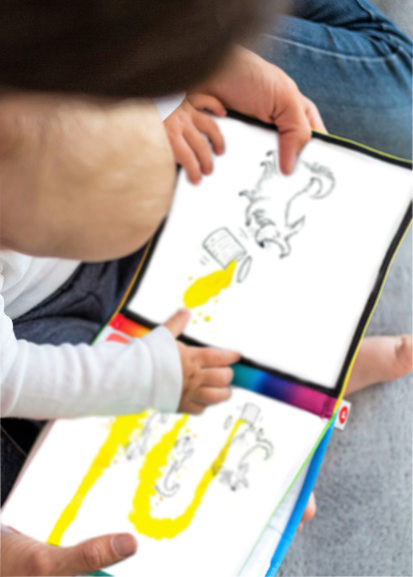
Tips for parents of toddlers
Being a toddler is all about ACTION. Everyday experiences are full of opportunities to engage in conversation and develop language skills.
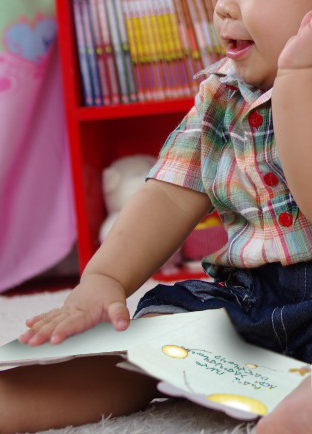
Don’t expect your toddler to
sit still for a book
Toddlers need to MOVE, so don’t worry if they act out stories or just skip, romp, or tumble as you read to them. They may be moving, but they are listening.
Ask questions
Take time to listen to your toddler’s answers. Toddlers have strong opinions and interesting ideas about the world. Encourage your toddler to tell you what she or he thinks.
Keep reading short, simple, and often
Toddlers frequently have shorter attention spans than babies. Look for text that is short and simple. Read a little bit, several times a day.
Not having fun?
Try a different story or a different time during the day. Reading with a very young child is basically about building positive experiences with books, not finishing every book you start.
Find books to read to your toddler >>
Tips for parents of preschoolers
Read early and read often. The early years are critical to developing a lifelong love of reading. It’s never too early to begin reading to your child!
Read together every day
Read to your child every day. Make this a warm and loving time when the two of you can
cuddle close.
Give everything a name
Build your child’s vocabulary by talking about words and objects. For example, “Look at that airplane! Those are the wings of the plane. Why do you think they are called wings?”
Talk about writing, too
Mention to your child how we read from left to right and how words are separated by spaces.
Point out print everywhere
Talk about the written words you see in the world around you. Ask your child to find a new word on each outing.

Find books for preschool children >>
Tips for parents of kindergartners
Play with letters, words, and sounds! Having fun with language helps your child learn to crack the code of reading.

Read it and experience it
Connect what your child reads with what happens in life. If reading a book about mammals, relate it to your last trip out on the land.
Trace and say letters
Have your child use a finger to trace a letter or syllabic while saying its sound. Do this on paper, on sand or soil, or on a plate of flour.
Write it down
Have paper and pencils available for your child to use for writing. Working together, write a sentence or two about something special.
Play sound games
Practice blending sounds into words. Ask, “Can you guess what this word is? m-o-p.” Hold each sound longer than normal.
Find books for kindergarten children >>
Tips for parents of 1st graders
Give your child lots of opportunities to read aloud. Inspire your young reader to practice every day!
I read to you, you read to me
Take turns reading aloud. Kids enjoy this special time with their parents.
Gently correct your young reader
When your child makes a mistake, gently point out the letter or syllabic she or he missed or read incorrectly. Many beginning readers will guess how to say a word based on its first letter or syllabic.
Talk, talk, talk!
Talk with your child every day about things happening in the house. Sprinkle some new words into the conversation, and build on words you’ve talked about in the past.
Write, write, write!
Ask your child to help you write out the grocery list, a thank you note to Grandma, or to keep a journal of special things that happen at home.
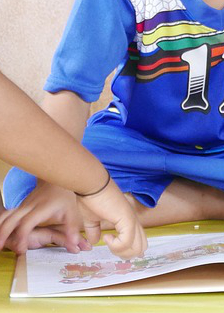
Find books for grade 1 children >>
Tips for parents of 2nd graders
Find ways to read, write, and tell stories together with your child. Always applaud your young reader and beginning story writer!
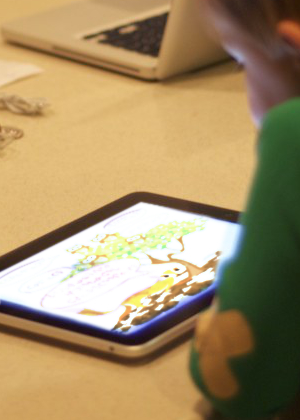
Tell family tales
Children love to hear stories about their family. Talk about something that happened when you were young.
Create a writing toolbox
Fill a box with drawing and writing materials. Find opportunities for your child to write, such as the shopping list, birthday cards, or thank you notes.
Create a book together
Fold pieces of paper in half and staple them to make a book. Ask your child to write sentences on each page and add his or her own illustrations.
Do storytelling on the go
Take turns adding to a story the family makes up while camping on the land or taking a walk. Try making the story funny, spooky, or “to be continued” the next time you are on the land or take a walk together.
Find books for grade 2 children >>
Tips for parents of 3rd graders
Read about it, talk about it, and think about it! Find ways for your child to build understanding, the ultimate goal of learning how to read.
Talk about what you see and do
Talk about everyday activities to build your child’s background knowledge, which is crucial
to listening and reading comprehension. Keep up a running conversation, for example, while cooking together, visiting somewhere new, or after watching a TV show.
Teach your child some “mind tricks”
Show your child how to summarize a story in a few sentences or how to predict what might happen next. Both strategies help a child understand and remember.
Different strokes for different folks
Read different types of books to expose your child to different types of writing. Some kids,
especially boys, prefer nonfiction books.
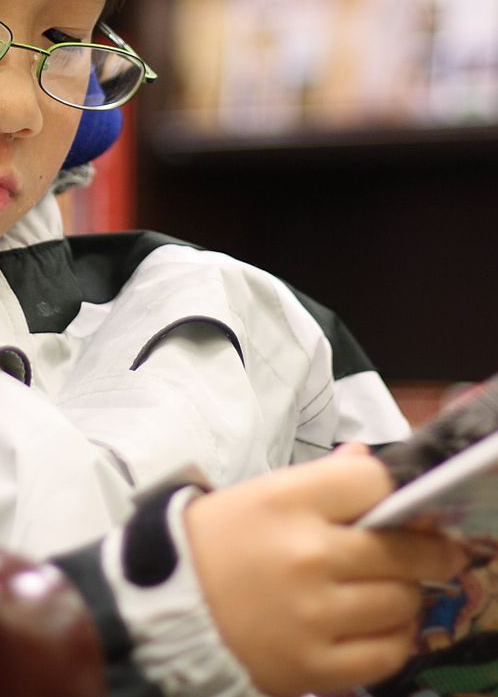
Find books for grade 3 children >>
Tips for parents of teenagers
Let your teen see you reading for pleasure and during routine activities such as reviewing flyers, recipes, instructions, newspapers, magazines, letters and e-mail.
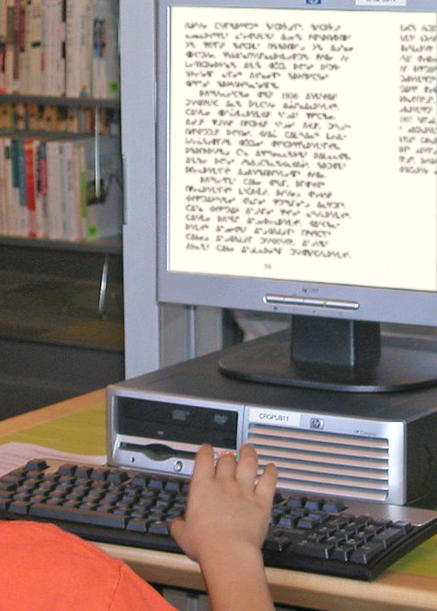
Family fun for everyone
If you have younger children or older relatives who can’t read, ask your teen to read out loud. Everyone will enjoy it!
Zero interest in reading?
Sometimes, teens just aren’t interested in reading. Maybe they are focused on their friends or activities. That’s normal. Give them some time, and keep lots of reading material around the house. They will pick it up when they are ready!
Read in both languages
It’s okay if your teens read in their first language, second language, or both languages! If your teens prefer reading in Inuktitut, this will help them keep their first language skills strong and give them more reading practice, which will also help their English reading skills too.
References
Reading Rockets (n. d.). Reading tips. Document available at https://www.colorincolorado.org/families.
